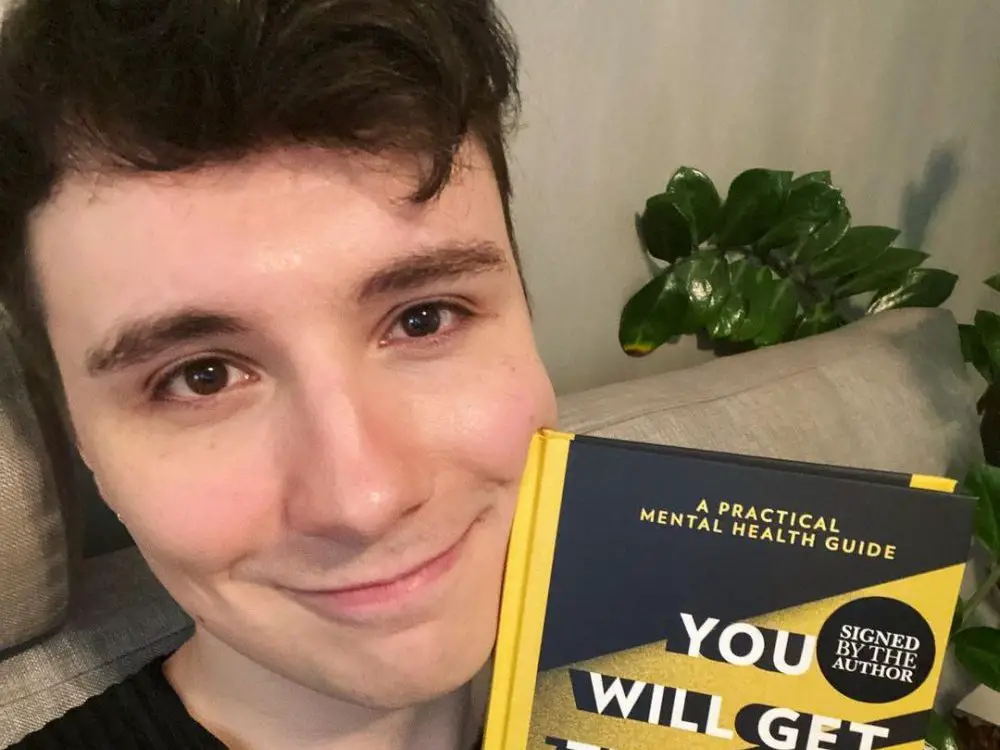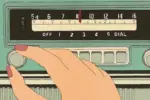“There’s a moment at the end of every day, where the world falls away and you are left alone with your thoughts. A reckoning. When the things you have been pushing to the background come forward and demand your attention.” — Daniel Howell
For over 10 years, Daniel Howell has been creating videos for his YouTube channel to showcase his dark, self-deprecating humor and share stories about overcoming struggles in his life. His channel has amassed over a billion views and he has captured the hearts of millions of followers across his social media platforms. The beloved entertainer has even earned the opportunity to star on a BBC Radio 1 show with his partner-in-crime, Phil Lester. The dynamic duo also partnered up to create the heartfelt and hilarious book “The Amazing Book Is Not on Fire” and perform two tours around the world to promote it. Now, the famous comedian and No. 1 New York Times bestselling author has emerged from his internet hiatus with a brand-new mental health guide titled “You Will Get Through This Night.”
Howell’s latest book takes a realistic approach to dealing with mental health for those struggling or just looking to make changes in their everyday lives. He writes from the perspective of someone who has lived through mental health battles of his own and frequently reveals intimate details about his inner struggles with his sexuality and depression. His life story and the advice that he offers are just what people need as proof that things will get better. “You Will Get Through This Night” was written in collaboration with clinical psychologist Dr. Heather Bolton, who brought honest information backed by science to bolster Howell’s helpful yet entertaining prose.
“A quarter of all people experience some kind of mental health problem each year,” Howell writes for those that feel alone in their struggles. “Mental health doesn’t discriminate: no matter how ‘successful’ someone may appear in all aspects of their life, they are still as likely to experience things like depression or anxiety.”
The opening section provides both a brief introduction to Howell for those who may not know him as well as a quick look at the biological explanations for common symptoms of poor mental health. For example, symptoms of anxiety such as a racing heart and trembling may make people feel that they are going to collapse or have a heart attack. These symptoms can be confusing and frightening considering people often find themselves panicking over small details, but in actuality, the body has been activated to prepare for action. In response, the heart beats faster to pump more blood around the body and the muscles prepare for action, whether it be fighting or fleeing.
The remainder of the book is separated into three sections: “This Night,” “Tomorrow” and “The Days After That,” which offers advice that people may need in the moment or the near future.
“This Night” focuses on managing thoughts and feelings during difficult times. To remove oneself from a negative headspace, it’s important to regulate breathing and redirect focus to the present. Those with anxiety know how easy it is to get caught up ruminating over the things in the past and worrying about what will happen in the future. It can be exhausting when the brain is programmed to think of the worst-case scenario in every situation, but Howell reminds his readers that it’s very human to do so.
There are several helpful exercises included in this section to help readers focus on the present, such as abdominal breathing, muscle relaxation and self-soothing by tuning into the five senses. Howell also recommends practicing mindfulness and meditation as well as talking to professionals that can help untangle the wires of the mind.
People who struggle with their mental health often report their symptoms being worse at night. Intrusive thoughts and a racing mind are what keep many individuals from getting a good night’s sleep. During the day, work and distractions keep people occupied in the present moment, but as soon as we try to quiet our minds, the things we didn’t want to think about begin to consume us. It’s of utmost importance to remember that mental health is going to be worse at night and that when the sun is shining on a new day, you’ll begin to feel better.
Part 2 of “You Will Get Through This Night,” titled “Tomorrow,” presents small and effective changes that can be applied to a person’s life to make difficult situations easier to control. After a rough night, it can feel challenging to do activities that others can do with ease, such as getting out of bed, taking a shower and eating food. Howell proposes that people start prioritizing the things that they need to accomplish by drawing out a value and effort chart.
Activities such as drinking water are of high value and low effort, so they should be prioritized over other activities that are low value and high effort, such as reorganizing the closet or bookshelf. Try to avoid making excuses and work on high-priority pursuits first.
There are several other small changes to keep people from having dark and sleepless nights. Among the easiest are changes that can be made to the environment, such as cleaning the rooms you use the most and spending more time outdoors. Scientific evidence proves that sunlight and plants can improve one’s mood. Going on walks and exercising outside will not only improve your mood and give you time to reflect, but it will also make you feel more tired and improve your quality of sleep.
The third and final section of Howell’s book, “The Days After That,” helps people understand their behavior and teaches them how to treat themselves kindly when tackling the challenges that life throws at them. Some of the tips and tricks that “You Will Get Through This Night” offers include setting boundaries (and sticking to them!) and going to therapy. Howell also discusses the long list of cognitive distortions — patterns of thought that lead people to see things more negatively — and explains how to combat them.
One of the most common distortions is catastrophizing. For example, many people worry about being late to important appointments or meetings so much that they believe their life or career will suffer. To stop oneself from indulging in this thought pattern, it’s important to remember that it’s okay to be late once in a while and that, either way, you will survive.
Something that’s key as new COVID-19 variants again raise the threat of lockdown is resiliency. Just when we think that we’re in the clear, life throws us another curveball. It’s crucial to learn how to cope with these surprises and not let the chaos prevail. “Remember that mental health is not a straight line,” Howell explains. “Life is naturally full of moments of change that we need to be able to handle. Breakups, moving, changing jobs — things that are very common can throw us off our track and we should all know how to keep ourselves on the rails.”
Training resilience can help people continue moving in the face of adversity. This can be done by being “realistically optimistic,” as Howell describes. Instead of concentrating on things that cannot be controlled, redirect attention toward things that can be controlled and viewing challenges as opportunities. For instance, a single person cannot predict and control COVID-19 outbreaks, but we can all do our part by wearing masks and getting vaccines. Being realistic and fair with ourselves can feel difficult when we are feeling down, but it will increase our chances of succeeding tenfold.
Making a conscious effort to understand one’s emotions takes a lot of hard work and dedication, regardless of who you are. It can be especially difficult for men to be vulnerable with their emotions. Society pressures men to put on a tough exterior and never ask for help lest they be perceived as weak. Howell shares his history of toxic masculinity and coming to terms with his sexuality in an interview with GQ Magazine.
“There’s still this notion that young people on the internet are always complaining about things and asking for attention,” Howell says. “There’s this idea that they’re weak or not being manly, but in my experience, it’s the opposite of that. If you are willing to look at yourself in the mirror and ask yourself, honestly, ‘What are the issues with my life?’ that’s bravery.”
In “You Will Get Through This Night,” Howell offers advice that is backed by science and told in an entertaining way. Everyone can benefit from “You Will Get Through This Night,” whether they are in a mental health crisis or are just looking to make changes to improve their everyday lives. If you or someone that you know is struggling or going through a crisis, do not hesitate to reach out to a medical professional or call 1-800-273-TALK (8255) to reach a 24-hour mental health hotline. “You Will Get Through This Night” promises that you will survive your darkest hours with a little bit of dedication.

















